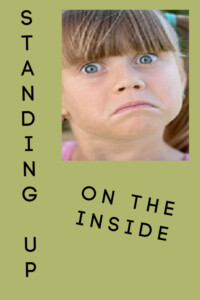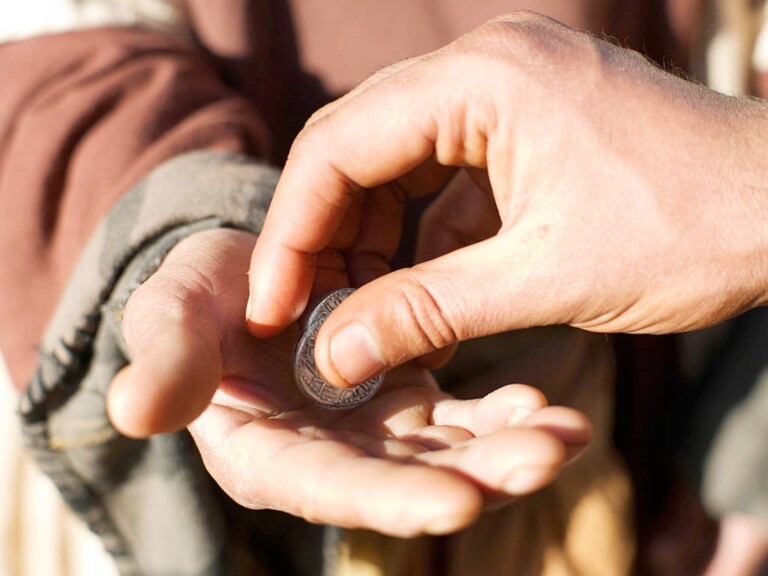Still Standing Up on the Inside
 Is “standing on the inside” spunk or defiance?
Is “standing on the inside” spunk or defiance?
Mom Slabach knew about “standing on the inside” and about spunk. She always said she wouldn’t give a dime for a kid without some spunk. She had no patience with a child who acquiesced to anything without questioning.
“Kids need to learn to think for themselves,” she told me. “How else will they be able to stand alone when they’re older and peer pressure hits them?”
Mom and Pop raised their eight with an abundance of strength and grace. Some were more laid back than others. Her second child (my Dave), was one of her strongest-willed, but she didn’t let that intimidate her or her parenting.
Giving in or standing up on the inside
There’s the story of the pot broken when he let the plant in it fly like a slingshot. It seems he was being disciplined and had to stay inside. In his frustration, he grabbed the stem of a plant and swung the entire thing around like David with his slingshot. Then he let the pot fly toward an unseen Goliath. It flew, all right – and landed across the room, shattered.
It took Dave longer than most of his siblings to give in, most days. He had a brother who cried at the first crack of a spanking. Not Dave. He tightened his resolve and his bottom, resulting in a longer spanking. [Yes, I think there’s a place for the-right-kind-of spankings.] I’m not sure if that was brawn or brains on his part, but he felt crying at the first lick was acquiescing, and holding out showed stamina and resolve. At least, that’s how he still tells the story today.
There’s the story of the time he misbehaved and was instructed to sit in a chair. Today we’d call that Time Out. Back then, it was just sitting in a chair until the child was repentant and sorry.
This time, Davy was not happy about sitting in a chair. He was still upset and, whatever the infraction, he didn’t think sitting in a chair was fair – or necessary. Not only did he not cry when first spanked, he did not sit willingly in a chair as part of the discipline handed out by his mother.
You’d think the kid would sit down, shut his mouth, cool down and be repentant so he could go play. Oh no, not Davy. Not this boy! Ever one to want to win a battle, he sat down wiggling in the chair.
Then, for all within his presence to hear, he stated emphatically, “Well, I’m STILL STANDING UP ON THE INSIDE.”
You can make me but I don’t have to agree. You can force me but I’m only giving in because I have to and not because my heart is changed. Fact is, just so you know I’m still at odds with you, I have to let you know I’m still standing on the inside.
He would have been smarter to keep his thoughts to himself. But this time, he was more stubborn than he was smart.
I’m not sure what the outcome of that episode was, but I’m positive his mama won the battle. Not only did she win that day, but she won many days and years after that. I know she didn’t give up on this stubborn tow-headed boy of hers. I know because I live with the results.
 Loving while disciplining
Loving while disciplining
Mom (Orpha) loved her kids fiercely, and that’s why she didn’t give up. She reckoned that the places her kids ended up as adults were largely dependent on their raising – or lack of it.
Mom knew that when you really love someone, you do what’s best for them, even when it hurts. Oh, she loved those kids.
So much so that her brother Paul said of her, “Orph used to love on her kids as hard as she spanked on them. She could pick one up and just smack the livin’ daylights out of their bottom and they couldn’t be sure if she was correcting them or loving on them!”1
Winning the war
I thought about Mom when we were raising our brood. She wasn’t here to ask for advice, but I’d heard enough stories that I knew what she’d say if I could ask her. I’d also spent enough years with her that I’d learned from one of the best.
I learned how important it is for our kids to know we love them. And I learned that we haven’t won the battle if our kid is still standing up on the inside.

Photo Credits: https://pixabay.com
Footnotes
1 Slabach, Gertrude M. Aren’t We Having Fun Dying?! Masthof Press, 2004, p. 6







